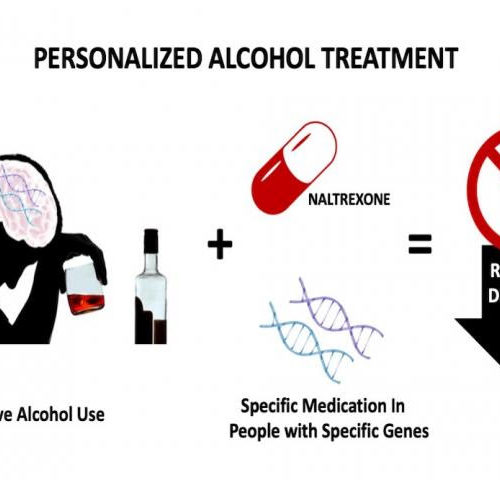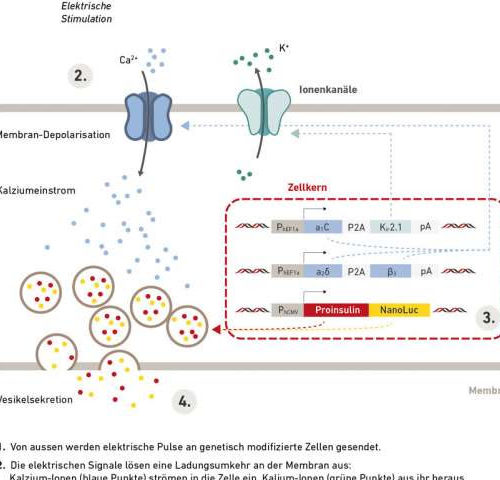by Sarah C.p. Williams, Gladstone Institutes Unlike most T cells, which launch immune responses against foreign molecules, regulatory T cells are the peacekeepers of the human immune system, damping down inflammatory reactions when they’re not needed. Now, researchers at Gladstone Institutes, in collaboration with scientists at UC San Francisco (UCSF) and the Technical University of Munich...
Tag: <span>Genes</span>
Three genes predict success of naltrexone in alcohol dependence treatment
MEDICAL UNIVERSITY OF SOUTH CAROLINA IMAGE: PERSONALIZED ALCOHOL TREATMENT Considering a patient’s genetics could inform clinicians which medications would be most effective in controlling cravings and treating alcohol use disorder. Twenty million Americans currently struggle with an alcohol use disorder. Of those who seek treatment, only 20% receive medications, either alone or in addition to...
Fish maze experiment provides new hope for degenerative diseases
by University of Portsmouth Zebrafish in the maze. Credit: University of Portsmouth A test of fish behavior in a maze has shed light on human degenerative conditions, heralding new hope for treatments. Fish swimming through a simple maze has shown ‘exceptional’ potential to improve progress in developing treatments for brain and psychiatric disorders, including Alzheimer’s...
Birmingham scientists ‘re-train’ immune system to prevent attack of healthy cells
The body’s immune system can be re-wired to prevent it from recognising its own proteins which, when attacked by the body, can cause autoimmune diseases like multiple sclerosis, a significant new study by UK scientists has found. Autoimmune diseases are caused when the immune system loses its normal focus on fighting infections or disease within...
Using electrical stimulus to regulate genes
A team of researchers led by ETH professor Martin Fussenegger has succeeded in using an electric current to directly control gene expression for the first time. Their work provides the basis for medical implants that can be switched on and off using electronic devices outside the body. Credit: Katja Schubert / after Krawczyk K et...
Using the CellAge Database to Find Genes Associated with Inhibition of Cellular Senescence
A senescent cell ceases replication and secretes inflammatory and pro-growth signals. The process serves a useful function when such cells are present for a short time and then destroyed, aiding in suppression of cancer and in wound healing. When senescent cells linger, they cause chronic inflammation and significant disruption to tissue function, however. This is...
Genes could play a role in tooth decay and gum disease
Tooth decay and gum disease impact on illness and healthcare spending, yet the role of genetics in dental problems is largely unknown. New research led by an international team, including researchers at the University of Bristol, suggests hereditary traits and factors such as obesity, education and personality could play a role in tooth decay and gum disease. Tooth decay and periodontitis, also known as gum disease, are among the most common diseases around the world but...
Sickly sweet or just right? How genes control your taste for sugar
by Daniel Liang-Dar Hwang, The Conversation You might love sugary doughnuts, but your friends find them too sweet and only take small nibbles. That’s partly because your genes influence how you perceive sweetness and how much sugary food and drink you consume. Now our recently published study shows a wider range of genes at play than anyone thought. In particular, we suggest how these genes might work with...
SOME WATER DISINFECTION MISSES DRUG-RESISTANT GENES
POSTED BY SARAH MCQUATE-WASHINGTON Huan He examines how well bacteria grew on agar plates containing an antibiotic. (Credit: Mark Stone/U. Washington) Current water and wastewater disinfecting methods work well to deter bacterial growth, but have varied success in fighting an antibiotic resistance gene, according to new research. Each year, antibiotic-resistant bacteria infect at least 2 million...
23andMe will tell you how your DNA affects your diabetes risk. Will it be useful?
MOUNTAIN VIEW, Calif. — As more people get genetic testing to assess their risk of getting cancers and other serious conditions, diabetes has been almost entirely left out — largely because of the difficulty of developing a useful test. But at the South by Southwest festival on Sunday, the consumer genomics giant 23andMe announced that...




